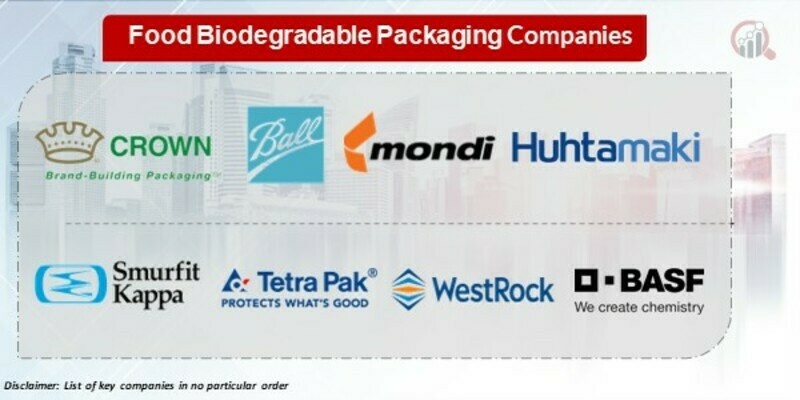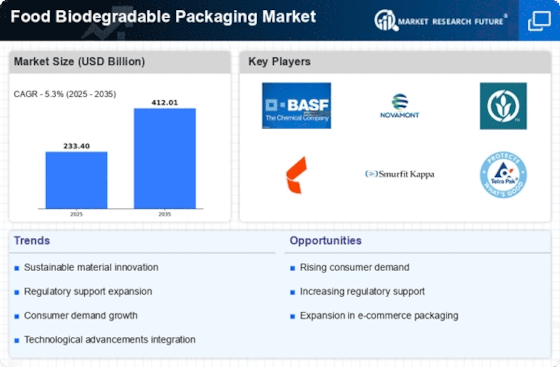Top Industry Leaders in the Food Biodegradable Packaging Market

The food packaging industry is facing a monumental shift, fueled by rising environmental concerns and a growing consumer appetite for sustainable solutions. Enter the food biodegradable packaging market challenging the dominance of traditional plastic packaging. Let's delve into the strategies employed by key players, the factors influencing market share, and the recent developments propelling this eco-conscious domain.
Strategies Shaping the Sustainable Arena:
-
Material Innovation: Leading companies like EcoProducts and Biopac are pioneering new biodegradable materials like plant-based resins, fungi-based foams, and even seaweed-derived films. Think sturdy boxes molded from agricultural waste, flexible pouches crafted from cellulose, and transparent wrappers spun from corn starch. -
Compostability Focus: Ensuring complete decomposition in home or industrial compost facilities is crucial. Companies like World Centric and NatureWorks are developing certified compostable materials that break down rapidly without harmful residues. -
Partnerships and Collaborations: Strategic alliances with food chains, restaurants, and packaging manufacturers help brands gain access to new customer segments and leverage existing distribution networks. -
Sustainable Sourcing and Practices: Implementing ethical sourcing of raw materials, minimizing energy consumption during production, and reducing carbon footprint are key differentiators for eco-conscious consumers. -
Consumer Education and Awareness: Raising awareness about the benefits of biodegradable packaging and educating consumers on proper disposal methods is crucial for driving market adoption.
Factors Influencing Market Share:
-
Performance and Functionality: Biodegradable packaging must offer comparable shelf life, protection, and convenience to traditional options to gain widespread acceptance. -
Cost Competitiveness: Bridging the cost gap between biodegradable and traditional packaging remains a challenge, but economies of scale and technological advancements are steadily narrowing it. -
Regulatory Landscape: Stringent regulations on plastic waste and landfill diversion in countries like the European Union are creating lucrative opportunities for biodegradable alternatives. -
Brand Reputation and Sustainability Commitment: Consumers are increasingly choosing brands with strong environmental credentials, making sustainability a key market differentiator. -
Geographical Expansion: Entering emerging markets with high plastic consumption and growing environmental consciousness presents significant growth potential.
Industry News and Market Trends:
-
Rise of E-commerce and Food Delivery: The surge in online food purchases and meal delivery services is driving demand for sustainable packaging solutions for takeaways and single-use containers. -
Focus on Home Composting: With increasing interest in backyard composting, companies are developing readily compostable packaging suitable for home waste management. -
Integration with Smart Technologies: Tracking the decomposition process and ensuring proper disposal through embedded sensors and blockchain technology are promising advancements. -
Investment in Research and Development: Leading research institutions and universities are collaborating with packaging companies to explore novel materials and accelerate innovation. -
Focus on Circular Economy: Implementing closed-loop systems for collecting and recycling used biodegradable packaging is crucial for long-term sustainability.
Key Players:
-
Crown Holdings Inc
-
Ball Corporation
-
Mondi Group
-
Huhtamaki Oyj
-
Smurfit Kappa
-
Tetra Pak
-
Westrock
-
Sealed Air Corporation
-
BASF
-
Amcor
Recent Developments:
August 2023: Unilever partners with a startup to develop edible seaweed-based wrappers for snack bars, paving the way for innovative edible packaging solutions.
September 2023: The World Packaging Organization hosts a global conference dedicated to sustainable packaging, showcasing advances in biodegradable materials and recycling technologies.
October 2023: California enacts a statewide ban on single-use plastic straws and utensils, further boosting the demand for biodegradable alternatives in the foodservice industry.
November 2023: A major food delivery platform announces a transition to 100% compostable packaging for all takeout orders, setting a precedent for the industry.
December 2023: Scientists develop a new biopolymer made from bacterial cellulose, offering superior heat resistance and opening doors for wider food packaging applications.
January 2024: The Indian government announces plans to invest in biodegradable packaging research and development, aiming to establish India as a leader in sustainable packaging solutions.










